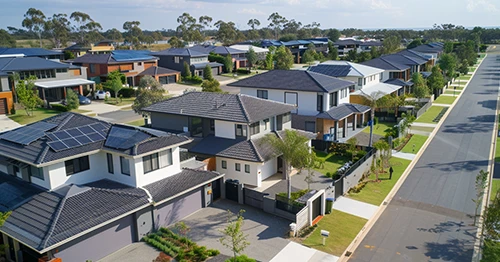Updated: 27 Mar, 2025
Federal Treasurer Jim Chalmers announced the budget on March 25, and it brings several changes that could affect homebuyers, property investors, and homeowners.
With housing affordability a major concern, this budget has introduced a range of initiatives aimed at increasing housing supply, supporting first-home buyers, and strengthening the rental market.
Key Budget Announcements
Here are the key budget announcements that can affect housing:
Interest Rates and Inflation Outlook
The budget’s stance on inflation and economic growth suggests that interest rates may stabilise in the coming months. The government aims to balance affordability pressures while maintaining economic stability by addressing infrastructure bottlenecks and investing in housing supply.
First-Home Buyer Assistance
The government has expanded the Help to Buy program to assist first-home buyers by increasing maximum property prices and income caps, making the scheme more accessible.
Under this initiative, eligible buyers can receive an equity contribution of up to 40%, allowing them to purchase homes with a lower deposit and smaller mortgage.
In discussing the government’s approach to housing affordability, Treasurer Jim Chalmers emphasised, “Housing supply and affordability is one of the biggest challenges facing our economy and our communities.Tonight we’re expanding our Help to Buy scheme. This will help 40,000 Australians buy their first home in the next four years.”
Housing Affordability
The budget allocates $1.5 billion through the Housing Support Program to improve planning, deliver infrastructure, and build more social housing.
The Housing Australia Future Fund (HAFF) and Social Housing Accelerator will also contribute to a pipeline of 55,000 social and affordable homes, with 18,000 to be delivered under the first two rounds of HAFF.
Additionally, $4.5 billion in funding is committed to addressing infrastructure backlogs and accelerating the construction of new homes. The government’s national target of 1.2 million new homes over five years is expected to help increase supply and ease affordability pressures.
More Energy Bill Relief for Homeowners
The government is extending energy bill relief to the end of 2025 for every household and around 1 million small businesses. In addition, the government will provide around $1.8 billion in payments, on top of the nearly $5 billion of bill relief delivered so far.
Every household and around 1 million small businesses will receive two $75 rebates directly off their electricity bills through to 31 December 2025.
Commonwealth and state energy bill relief has already helped to lessen electricity price increases, with prices dropping 25.2 per cent across 2024. The additional Commonwealth rebates are expected to maintain downward pressure on prices.
Incentives For Australian Investors
A two-year ban on foreign buyers purchasing existing dwellings from April 2025 aims to prioritise housing availability for Australian residents.
The government is refining Build to Rent tax concessions, supporting the construction of 80,000 new rental homes, including 8000 affordable tenancies.
Commonwealth Rent Assistance rates have risen by 45%, marking the first back-to-back increase in over 30 years.
The government is implementing A Better Deal for Renters, ensuring fair eviction rules and limiting rental increases to once a year.
Addressing the ban on foreign investors purchasing established homes, Treasurer Chalmers remarked, “We’re easing pressure on the housing market by banning foreign investors from buying established homes, and cracking down on foreign land banking as well.”
Boosting The Construction Workforce
To meet ambitious housing targets, the government is launching the Housing Construction Apprenticeship stream, offering financial incentives of up to $10,000 for apprentices in housing construction trades.
Employers hiring apprentices in priority occupations may also receive a $5000 incentive. These measures aim to address workforce shortages and ensure a steady pipeline of skilled construction workers.
Final Thoughts: What Should You Do Next?
- If you’re a first-home buyer: Take advantage of the expanded Help to Buy scheme to reduce your mortgage burden and enter the market sooner.
- If you’re a homeowner: Monitor interest rates and consider refinancing options as the economic landscape stabilises. Also, benefit from the extended energy bill relief.
- If you’re an investor: The Build to Rent incentives and foreign buyer restrictions may create new opportunities.
As more details unfold, staying informed and seeking professional financial advice will be essential for navigating the evolving housing market.
If you want to read more housing-related budget announcements in detail, you can do it here.





